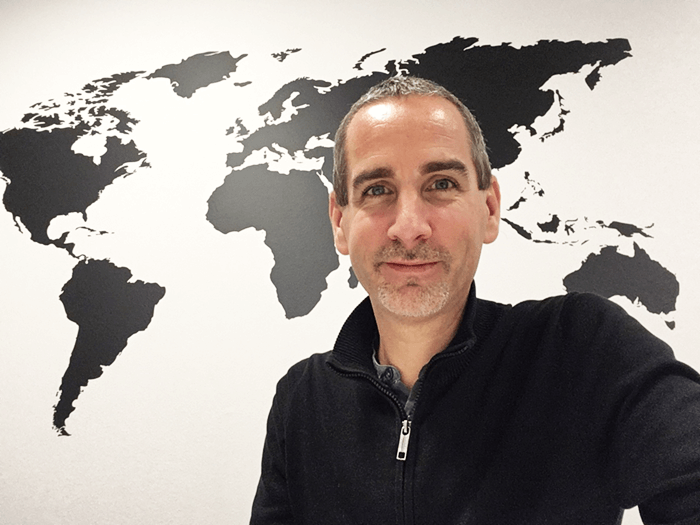Congratulations on receiving the GC×GC Lifetime Achievement Award in Riva del Garda earlier this year!
I must admit receiving a “lifetime achievement” award makes me feel quite old! But it’s great to receive recognition of the work my group has been doing over the past few years. In particular, it was a special moment to be presented the Award by John Dimandja – the man who first introduced me to GC×GC 20 years ago and is still a friend and mentor today.
What was your route into analytical chemistry?
I did my Master’s thesis in organic chemistry and, when it came time to choose my PhD, an opening came up in analytical chemistry. I wasn’t immediately enthusiastic – my perception of analytical chemistry at the time was through student labs, which I found very dull. So why did I go for it? First, the project involved mass spectrometry, which is a cool technique. And second, the practical application of the work caught my attention – developing GC-MS methods to measure toxic dioxins in food. As interesting as fundamental science can be, research for the sake of research doesn’t excite me. I need to see how my measurement will be used. It didn’t take long to find out just how relevant these particular measurements were for human health – I started my PhD in 1998 and the Belgian dioxin crisis exploded in 1999! Polychlorinated biphenyls were found in Belgian chicken and eggs, and accusations of a cover-up led to a huge political scandal and panic amongst the public. There was a great deal of pressure to get the analyses right, and the tools I developed back then are still used in routine labs 15 years later.
How did GC×GC come into the story?
I traveled to the USA to learn from an expert in dioxins, Don Patterson, then at the US Centers for Disease Control and Prevention (CDC). Through Don, I met and worked with John Dimandja, a real pioneer of GC×GC, and was instantly struck by the potential of the technique. I came home from that trip with a single chromatogram… And I was delighted to have even achieved that! Now, things have moved on and producing modulated traces is easy, but as we look at bigger sample sets, the challenge has shifted to data processing.
What are some of the current projects your team is working on?
We work in a wide variety of applications using GC-MS and GC×GC. Though we still do some work with persistent organic pollutants (POPs), we have an increasing focus on forensics, cancer research and petroleum. In forensics, our work centers on the volatile organic compound (VOC) composition of cadaveric odor, to help police investigate suspicious deaths and to aid search and rescue teams in locating bodies in disaster zones.
We also work on headspace analysis for the diagnosis of a range of cancers. Working with our partner hospital to collect samples of healthy and diseased tissue from the same colorectal cancer patients, we compare the VOC profiles of the samples. We hope to “sniff out” cancer in the same way that medical detection dogs can be trained to do.
Another interesting recent project has been looking at the composition of e-cigarette and heated tobacco vapor. These are very complex, challenging samples and there is an urgent need for more information on their potential health effects.

Tell us about the Multidimensional Chromatography Workshop you are helping to organize.
For 2019, the workshop will be at the University of Liège; it is completely free to attend so it’s a great opportunity to bring together this specialized community. There will be a full program of educational sessions, but also a strong emphasis on networking. After all, a lot of the most important interactions at any conference occur over lunch or a glass of wine. Register here.
How do you fit all of your responsibilities in?
That is my major challenge – in between teaching, research projects and my role as head of the department, it’s a delicate equilibrium! My first priority is my family, so I make a rule never to bring work home – I may work late sometimes, but once I’m home, I’m home. With such varied research projects underway, I cannot be on top of all of them at all times, so I rely on my senior scientists to run things day-to-day. It can be frustrating to stand in the lab surrounded by instruments I’ve been dreaming of for years and know I won’t get the chance to use them myself, but seeing my team putting them to excellent use gives me great satisfaction.
What is your focus for the future?
Now that I’m a full professor and my situation is stable, I’m fortunate to be able to spend most of my energy on the talented young people that come through my lab. By training and mentoring others, you can multiply your successes and achieve far more than you could as an individual. In 10 or 15 years from now we could see some of the biomarkers from our research in routine use for detection of cancer – that would be amazing. Perhaps later in my career, when my kids are older, I might take a sabbatical and go back to the lab.
And spend some quality time with the instruments?
Yes, exactly!




